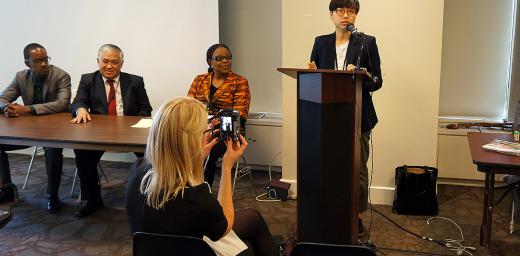LWF Launches Day of Fasting for the Climate

Solidarity with those vulnerable to climate change. Photo: LWF/Sean Hawkey
Monthly Action Begins 1 January in Solidarity with Those Vulnerable to Climate Change
(LWI) – The Lutheran World Federation (LWF) together with many other global organizations is launching a monthly Day of Fasting for the Climate beginning 1 January, urging prayer and spiritual reflection to express solidarity with those who are most vulnerable to climate change.
The call for fasting for climate justice offers religious communities an opportunity to address concerns for climate change in the lead up to the Conference of the Parties (COP 20) to the United Nations Framework Convention on Climate Change negotiations in Lima, Peru, in December 2014.
“We ask our LWF member churches to share this invitation and to embark on a Day of Fast for the Climate; to be active advocates in the context of climate change and climate justice,” said Dr Carlos Bock, director of the LWF Department for Mission and Development (DMD).
Bock said the fast is a way for Lutherans to express their common faith, spiritual and ethical values; to transform the Lutheran communion; and urge national governments to be more ambitious in climate change negotiations.
“For religious people, fasting is a sign of re-thinking how we live our lives, of repenting and of re-committing ourselves to a responsible and sustainable way of life,” said Ms Caroline Richter, LWF Youth secretary.
Richter added that millions of people have already lost their homes and livelihoods because of extreme weather events and the Day of Fasting for the Climate is an act of solidarity with them and an act of remembrance for the many who have also lost their lives.
“People of faith and different walks of life are standing together to build a groundswell of support for actions that slow climate change,” she said.
Participants and inviting organizations include several youth groups, the Climate Action Network (CAN), the World Council of Churches, the Global Call for Climate Action, Avaaz, 350.org, Friends of the Earth, Move On, 18 Million Rising, Forecast the Facts and the Climate Justice Network.
The fast will take place on the first day of every month until 1 December 2014, when the COP 20 meetings begin. The LWF delegation to COP 19 in Warsaw, Poland, which was composed of seven youth, initiated a fast that was supported by many different faith representatives.
Climate change is an ongoing concern of the LWF. It was named an advocacy priority in its 2012-2017 Strategy, and sustainability was the top concern of the 2010 LWF Youth Pre-Assembly.
The 2010 LWF Eleventh Assembly in Stuttgart, Germany, reinforced the commitment of the LWF to advocating for climate justice and “caring for the environment, which we do not own, so future generations may enjoy the fruits of creation and lead wholesome lives.”
The Assembly noted that the “window of opportunity” for reducing greenhouse gases is diminishing and that those who are most to blame for climate change are the least likely to feel the effects. It said vulnerable communities have been hard hit and that there has been a grave impact on food security.
Mr Ralston Deffenbaugh, LWF assistant general secretary for International Affairs and Human Rights, said the LWF advocates for climate justice through climate adaptation projects in its Department for World Service programs and its mobilization of youth at the COP meetings.
In launching the Day of Fast for the Climate, the LWF emphasized that fasting is a long-standing spiritual practice found in many religious traditions. In the Bible David fasted when his and Bathsheba’s child was seriously ill; Jesus fasted for 40 days and nights at the outset of his ministry.
“Fasting is at the same time and intensive bodily, i.e. physical, and a spiritual experience,” commented Rev. Dr Simone Sinn, LWF study secretary for Public Theology and Interreligious Relations.
“The deep meaning of fasting is to turn our attention towards God, to let our hearts and minds be touched by God’s presence, and thereby let go of wrongdoings and return to God,” Sinn added.
She said Luther called for a civil fast to “teach people to live more moderately” and for a spiritual fast prior to Easter, Pentecost and Christmas. Luther said fasting helps Christians know who they are in relation to God and their neighbors.
The LWF is providing resources on the theology of fasting and on the LWF’s experience and engagement for climate justice. Fasters who refrain from food for one day are advised to continue drinking water. Others may fast “carbon emissions,” through actions such as not taking a car, not using electronic devices, or by consuming eco-friendly products and food.
To follow and support the campaign, use the hashtag #fastfortheclimate.





